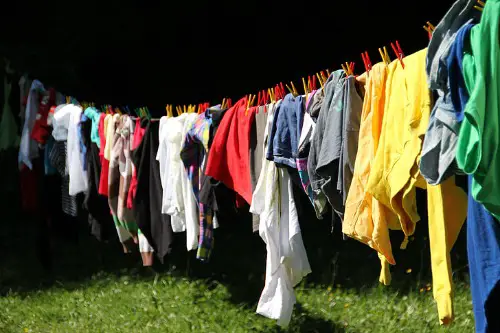1. Hanging Clothes on a Clothesline (Colorado, Maine, and some other states)

It might sound shocking, but in certain places like Colorado and Maine, hanging laundry out to dry on a clothesline can actually land you in trouble, according to ABA Journal. While it seems like a harmless and eco-friendly way to dry clothes, some homeowner associations (HOAs) have rules against it. They claim it reduces property value or ruins the aesthetic of the neighborhood. So, if you live in one of these areas, you might want to double-check those HOA guidelines before going full eco-mode with your laundry.
This law stems from concerns over how it looks to potential buyers or neighbors who prefer a more uniform, clean-cut look. Interestingly, many states with these laws are moving toward relaxing them due to growing environmental awareness. It’s definitely something to think about if you’re someone who loves a fresh breeze drying your towels. It might be best to keep your line hidden behind a fence or balcony if you don’t want to risk a fine.
2. Flipping a Mattress (California)

In California, flipping or rotating your mattress for resale is actually illegal in certain circumstances, according to Sleepline. This law was put in place to protect consumers from purchasing secondhand mattresses that could be unhygienic or potentially unsafe. To prevent the spread of bed bugs and other pests, the state requires mattresses to be thoroughly sanitized and labeled when sold. If you’re thinking about flipping a mattress you no longer need, check to see if the laws apply to your situation.
While it may seem like a simple and harmless task, selling a used mattress without proper cleaning and labeling can result in fines. California has stringent regulations around the resale of mattresses to ensure they meet health and safety standards. If you’ve been in the habit of passing along your old mattress or buying one secondhand, be aware of these specific laws. The goal is to prevent the spread of pests and maintain public health, which is why it’s important to follow the rules if you plan on selling or donating a mattress.
3. Owning an Exotic Pet (California, Hawaii, New York)

In some states like California, Hawaii, and New York, owning exotic pets such as certain reptiles, big cats, and even certain types of birds is illegal, according to the International Fund for Animal Welfare. These laws were enacted for conservation purposes, as exotic animals can become invasive species or create dangers to the ecosystem. Additionally, owning such pets can be risky, both for the animal and the owner. In fact, some states go so far as to ban specific species altogether, aiming to prevent any harm that might come from keeping them in an unnatural environment.
The intention behind these laws is to ensure that animals are treated humanely and that the environment remains safe. Many exotic pets require specialized care that a typical owner might not be prepared to provide. States like California also focus on protecting local wildlife by preventing the introduction of potentially dangerous species. If you’re thinking about adopting a unique animal, make sure to double-check what’s legal in your state first.
4. Sharing a Netflix Account (Tennessee)

Sharing your Netflix password might seem innocent enough, but in Tennessee, it can actually be against the law, Business Insider reports. The state has specific anti-piracy laws that criminalize sharing account information for subscription services like Netflix, Hulu, and Spotify. The reason behind these laws is to protect content creators and ensure that streaming platforms can properly track user subscriptions. So, while it’s common to share streaming logins among family and friends, you could technically be violating the law in some places.
The reasoning is rooted in preventing account-sharing for commercial gain or redistribution. Even if you’re not profiting from it, this law could lead to fines for individuals who share their account details. While it’s unlikely anyone would be prosecuted for a few passwords shared among friends, it’s still worth considering the potential consequences. Stick to the terms of service, and you should be in the clear—but always know your local laws just in case.
5. Collecting Rainwater (Colorado)

In Colorado, collecting rainwater is illegal unless you meet specific requirements, according to The Colorado Sun, even though it’s a practice many people across the U.S. use to conserve water. The law exists because of water rights issues; in Colorado, rainwater technically belongs to the state once it hits the ground. Collecting rainwater without permission can result in fines or penalties. If you’re hoping to collect rainwater for irrigation or other uses, you’ll need to ensure you’re following the rules.
This is a bit of an odd law, considering the rising concern over water conservation, but the state prioritizes managing its limited water supply. The law limits the amount of rainwater individuals can collect, particularly if it’s for larger purposes like drinking or irrigation. If you live in Colorado, you can still collect small amounts of rainwater, but you’ll need to register the collection system with the state to stay on the right side of the law. It’s always wise to check the local regulations before you break out the rain barrel.
6. Spitting on the Sidewalk (New York)

In New York, believe it or not, it’s illegal to spit on the sidewalk, a law that’s been on the books for ages. This regulation was put in place as part of public health initiatives during the early 20th century, when spitting was linked to the spread of diseases like tuberculosis. While it may sound old-fashioned today, the law is still technically in effect, though it’s not often enforced. However, if you happen to be in an area where the law is taken seriously, you could face a fine for spitting in public.
The reason behind this law is fairly straightforward: it’s about hygiene and keeping public spaces clean. Even though it might feel like an outdated rule, it’s there to protect public health in the event of an outbreak of contagious diseases. For many New Yorkers, it’s just something that’s part of city life, but others still abide by it. If you’re in the city, it’s probably a good idea to hold onto that saliva until you find a more private spot.
7. Not Accepting Cash (Oregon)

In Oregon, it’s illegal for businesses to refuse cash as a form of payment. In this state, there’s a law that mandates all businesses accept physical currency for transactions. The reasoning behind the law is to ensure that everyone has access to goods and services, regardless of whether they have access to credit cards or digital payment methods. So if you find yourself in Oregon with only cash in hand, rest assured that the store is legally obligated to accept it.
This law was created to protect consumers, especially those who may not have access to banking or credit services. In an increasingly cashless society, Oregon stands out for enforcing a law that guarantees the right to pay with paper bills. As a result, many businesses in Oregon will happily take your cash for purchases, but this is a rule that doesn’t extend across all U.S. states. In other states, the choice is up to the store or business whether to accept cash.
8. Driving Without a Shirt (Hawaii)

In Hawaii, it’s actually illegal to drive without a shirt on, which seems like an odd regulation at first glance. The rule falls under a category of laws focused on public decency and decorum, which prohibit indecent exposure. While it may not seem like a major issue, the state believes it’s important to maintain a certain level of modesty when out in public. In fact, this law can extend to both men and women, so if you’re cruising around the islands, be sure to put a shirt on before you hit the road.
The law was enacted with the idea that driving without a shirt could cause distraction or discomfort to others. It’s one of those quirky rules that most people aren’t aware of, but it’s still worth noting for anyone planning to enjoy Hawaii’s beaches and warm weather. Hawaii tends to take these regulations pretty seriously, so you could face a fine or ticket if you disregard the law. Keep that Hawaiian shirt on—literally—and you’ll be fine.
9. Using Your Car Horn Unnecessarily (New York City)

In New York City, honking your car horn unnecessarily can lead to a fine. Though car horns are obviously crucial for safety, this law is in place to reduce noise pollution in the already loud and bustling city. The honking rule aims to create a more peaceful environment for residents and to reduce stress caused by constant noise. Only honking in emergency situations or for safety concerns is allowed under this law.
This regulation is part of the city’s larger effort to tackle noise complaints, which have long been an issue in urban environments. It’s one of those laws you might not think about while navigating traffic, but in NYC, honking can trigger penalties. While the occasional honk when stuck in traffic might be inevitable, it’s best to be mindful of your horn’s use in the city. You’ll avoid the fine and keep the peace.
10. Carrying Ice Cream in Your Back Pocket (Alabama)

In Alabama, there’s a strange and old-fashioned law that prohibits carrying ice cream in your back pocket. While it might sound like a relic from a bygone era, it was supposedly created to prevent horse theft. The reasoning was that people used to lure horses away by placing ice cream in their back pockets, making it an easy method for rustlers to steal animals. So, while ice cream is delicious, it’s best to keep it out of your back pocket if you’re in Alabama.
This peculiar law highlights how sometimes rules are based on historical events that no longer apply to modern life. While it’s unlikely that anyone would be prosecuted for this today, it’s still technically illegal in Alabama. Despite its quirky origin, the law reflects how some rules survive simply because they’re written into the books. So, leave the ice cream in your hands, and you’ll be in the clear.


